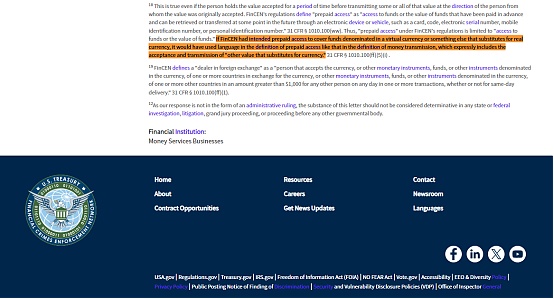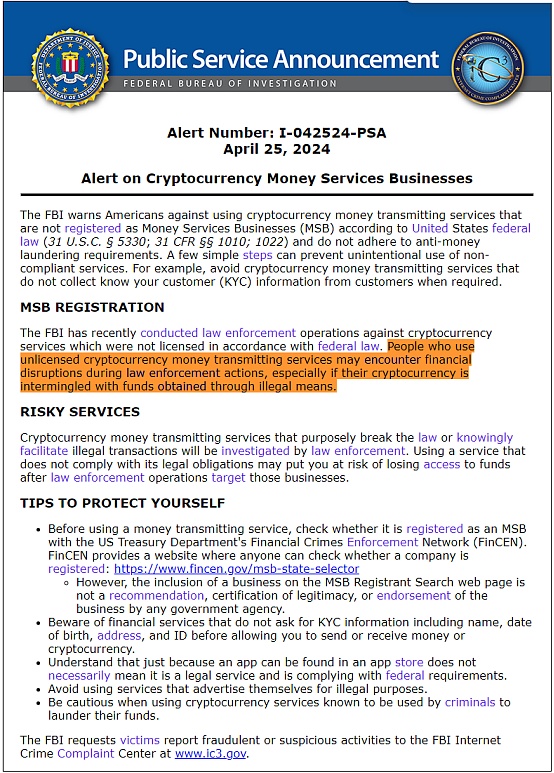
Author: Aiying; Source: AYING Compliance
Since 2013, the US government’s policy has actually been very clear, and believes that the developers and users of cryptocurrency wallets are not currency transmitters.But recently the Ministry of Justice has suddenly decidedCharges of unauthorized currency transmissionThe prosecution of wallet developers is very surprising, especially these developers do not actually control the assets that users use their software.
The federal prosecutor put forward this unprecedented explanation among the two recent cases. These two cases were the prosecution of Samourai Wallet, which was released on April 26 and the opinions of Roman Storm’s objections in the TORNADO CASH case announced on the same day.EssenceAt the same time, the Federal Investigation Bureau also warned the encryption wallet users saying that if they did not transfer funds to the regulatory agencies, they might lose these funds because of criminal seizure and investigation.Essence
1. Here is a brief review of existing currency transmission policies, a detailed summary of the recent incidents
A series of federal laws in the United States conduct anti -money laundering (AML) supervision on currency transmissioners, mainly based on the “Bank Secret Law” and its amendments.These laws define the category of “financial institutions” and authorize the Minister of Finance to redefine this category as needed.Therefore, the execution rules under the “Bank Secret Law” actually specify who must or not have to be registered as a currency transmitter or other financial institutions, abide by the principle of “understanding your customers” (KYC), submit a report to the government, and implement it and implement itOther anti -money laundering control measures.
These regulations define currency transmissioners:
-
Anyone who provides currency transmission services, of which “currency transmission services” are defined as “accepting the value of currency, funds or other alternative currencies from a person, and transmitting the value of currency, funds or other alternative currencies in any wayGive another place or person “;
-
Anyone who participates in the transfer of funds.
In the context of cryptocurrencies, this definition has some vagueness for whether cryptocurrencies are “currencies, funds or other values of alternative currencies”.If cryptocurrencies are regarded as “funds”, “anyone involved in transfer” is a currency transmitter.If cryptocurrencies are considered “currency” or “other values that can replace currency”, then anyone who “accepts” and “transmits” cryptocurrencies is a currency transmitter.According to the direct interpretation of the regulations, cryptocurrencies are regarded as a substitute for traditional currencies. Therefore, if someone accepts and transmits the cryptocurrencies of others in a business manner, he is a currency transmitter.In other words, if someone actually controls the cryptocurrency of others and uses this control to transfer the cryptocurrency to another person or place, he is the currency transmitterEssenceThis law was already a controlling law before the emergence of cryptocurrencies, and was never modified or overturned by Congress, courts or rulesEssenceThis tiny vagueness about whether cryptocurrencies are currencies, funds or alternative currencies will be resolved by FINCEN in the early days of the history of cryptocurrencies.
In 2013, FINCEN released its first “virtual currency” guide.In this guide, FINCEN confirms that cryptocurrencies (they call virtual currencies) are “value of alternative currencies”, not “funds” or “currency” itself (therefore called “virtual currency”).In a remark, it also clearly states that virtual currency is not regarded as “funds” because this definition will trigger some prepaid access rules, and FINCEN believes that these rules are not suitable for cryptocurrency activities.
>
FINCEN further explained that only users who use virtual currencies are not currency transmitters, and in a subsequent administrative rule, it is found that software developers are not currency transmitters: “Only production and distribution of software itself does not constitute acceptanceAnd transmission value, even if the purpose of the software is to promote the sales of virtual currenciesEssence”
In addition, FINCEN released more guidance in 2019It is clearly pointed out that the part of the virtual currency is not enough to classify the wallet developer as a currency transmitterBecause those who participated in the transaction and the people who should hold the currency need to request additional verification, they did not have completely independent control of these values.
This guidance requirementOnly enterprises that are hosting cryptocurrency business need to obtain permission and are constrained by federal currency transmission regulationsEssenceThe law has always been clear:Non -custody cryptocurrency developers are not currency transmitters.
2. Details and controversy points of the case
On April 26, 2024, an indictment was publicly charged with Samourai Wallet (a Bitcoin Wallet with Coinjoin transactions to enhance user privacy) developers.In this discussion, we do not discuss the allegations of money laundering and co -conspiracy, because this allegation depends on the specific facts, and it is not necessarily based on developers with custody services rather than non -custody services.The defendant may operate a centralized server to coordinate Coinjoin transactions as allegations.However, according to our current understanding, Samourai Wallet does not allow developers or any third party to truly control the Bitcoin by protecting users through wallet software.According to the direct interpretation of the regulations, especially considering the guidance and administrative ruling of FINCEN,Samourai Wallet’s developers did not have “completely independent control” of any user’s funds, so they are not defined by currency transmitters.
In Roman Storm’s Tornado Cash case, the prosecutor responded to the previous rejection request.They discussed a law called “Article 1960”, which said that if it is not permitted, it is illegal to operate the currency transmission business illegally.The prosecution’s response particularly emphasized that the definition of this law is much more broader than the definitions we usually discuss.
Their main argument is that as long as the Tornado Cash software is used to ask for deposit or withdrawal, the cryptocurrency will move on the Ethereum blockchain. Therefore, they think that the developers of Tornado Cash should be responsible for this.This statement has expanded the scope of responsibility, which means that according to this logic, almost all cryptocurrency wallets and smart contracts are undergoing currency transmission business, and all developers may involve illegal currency transmission.
In terms of regulatory definition, the prosecutor’s response ignored all the previous guidance, explaining the “funds” in the law very widely, and simply defining it as anyone involved in the transfer.They even metaphorize this as a package delivery, trying to explain that the control funds are not necessaryEssenceThis explanation ignores the statement of the US financial criminal law enforcement network (FINCEN) that virtual currency is not a “fund” statement, which is also very ridiculous.
If Tornado Cash is a package service, it is obviously not just serving criminals.Secondly, the prosecutor’s comparison actually proves the completely opposite facts they want to prove.A courier service that cannot access its transmission package is obviously not monetary transmission services.First of all, if you can’t open the package, how do you know what is inside?If you are told that you are only transporting cans of canned food and unable to open the box.Secondly, the financial crime execution network (FINCEN) clearly stipulates that the armored vehicle service limited to safe transportation currency does not belong to the monetary transmission service provider!
At the same time, the Federal Investigation Bureau (FBI) issued a warning announcement on encrypted wallets.announcement”remindAmericans should not use cryptocurrency transmission services that have not registered in accordance with US Federal Law (MSB).The FBI also provides FINCEN’s official tools, allowing users to check whether a company is registered as MSB.
In view of the prosecution cases of Tornado Cash and Samourai Wallet, if the position of the judicial department is, any behavior that allows cryptocurrencies to pass from one place to another place on the Ethereum blockchain (as the Tornado CASH defense) is considered considered to be considered considered to be considered considered to be regarded asCurrency transmission, then every encrypted wallet is a currency transmitter, whether it is software running on your phone, software running on your Trezor or LEDGER disk, or software running on the Coinbase server.Register for the Vegeous Monetary Service Business.In these three, only Coinbase is registered.Considering the recent prosecution case, many wallet companies, including decentralized wallets in the industry, are jurisdictions that need to attract attention.
>
It is unclear whether the Ministry of Justice has deliberately changed its long -term policy through criminal law enforcement, or it is said that the Ministry of Justice and the financial criminal law enforcement network (FINCEN) are seriously disconnected.But in any case, this approach is undoubtedly a serious damage to the principles of the rule of law in the United States.From the perspective of the topic, whether it is passed by the Tiktok Act or the recently troubled “Anti -Jewish consciousness Act”, we can all feel that the United States is also torn by ourselves.
Third, uncertain factors bring the evacuation of the encryption wallet in the US market
ACINQ, headquartered in Paris, stated that “the recent announcement of the US authorities allows people to be regarded as a monetary service company and even if the lightning service provider, and even lightning nodes of Lightning Service providers, and they have questioned.For uncertainty, it will be removed from its popular Lightning Network Wallet PHOENIX from the US app store.
One day later, ZKSNACKS announced that it would close its visit to the WASABI wallet that protected privacy in the United States, and in a statement on April 27th, “According to the recent announcement of the US authorities, ZKSNACKS is now strictly prohibited from U.S. users to use its services.”Essence
Fourth, problem
1. If the wallet is not for American users, do I still need to obtain permits and registration?
If a cryptocurrency wallet or service clearly does not face U.S. users, and ensure that American users cannot use their services, they usually do not need to obtain US currency transmission licenses or register as a currency service business (MSB).US laws and regulations are mainly applicable to companies operating or serving American residents in the United States.
However, even if a service is not directly facing American users, if it operates through the US financial system, or some American users find methods to use these services, then it may still attract the attention of the US regulatory agency.Therefore, it may be difficult to completely avoid the risk of US laws, especially in globalization and Internet environment.
In order to avoid potential legal risks, non -American cryptocurrency service providers should take measures to ensure that their services will not be accessed or used by American users.This may include technical measures such as geographical blockade and IP address filtering, as well as clearly stated in the service terms that do not provide services to American residents.
2. If you can’t avoid American users from seeing the needle, what is a secure way?
-
Register to serve the fund service enterprise (MSB):
In accordance with the requirements of the Financial Crime Law Enforcement Network (FINCEN), any individual or company that provides monetary transmission services must register as a fund service enterprise (MSB).This includes submitting the necessary registration form and updating any major change information.
-
Comply with the Banking Law (BSA) regulations:
Enterprises registered as MSB need to comply with the provisions of the Bank Secret Law and its amendments, including but not limited to but not limited to anti -money laundering (AML) regulations and submitting suspicious activity reports (SARS).
-
Implement customer understanding program (KYC):
-
Currency transmission services need to implement customer understanding procedures. This is a customer authentication process to prevent identity theft, financial fraud and money laundering activities.
-
Get the state -level license (MTL license):
In addition to registration at the federal level, most states also require monetary transmission services to obtain state -level licenses.The specific requirements of different states may be different, so you need to apply for the corresponding license according to the specific state operating by the enterprise.
-
Maintenance compliance records and reports:
Comply with all record preservation requirements and regularly report large transactions and suspicious activities to FINCEN regularly.These records may need to be provided in review or inspection.
-
Capital and insurance requirements:
According to the business scale and the type of transaction, it may need to meet certain capital preparation and insurance coverage requirements to ensure the security of customer funds.






